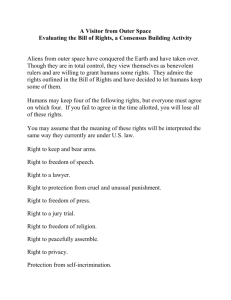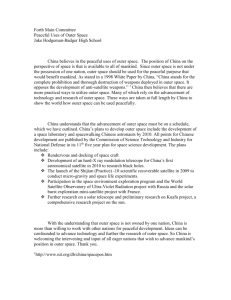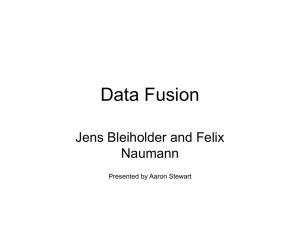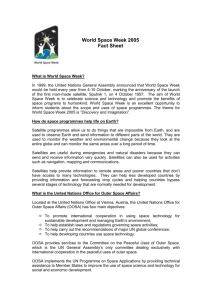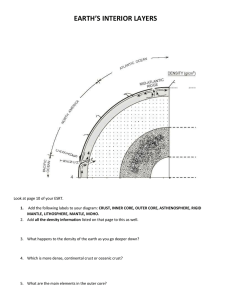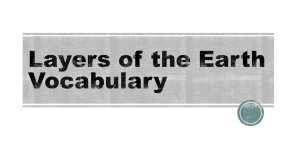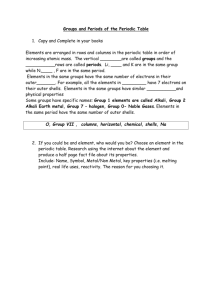Presentation by Mr.Victor Vasiliev
advertisement
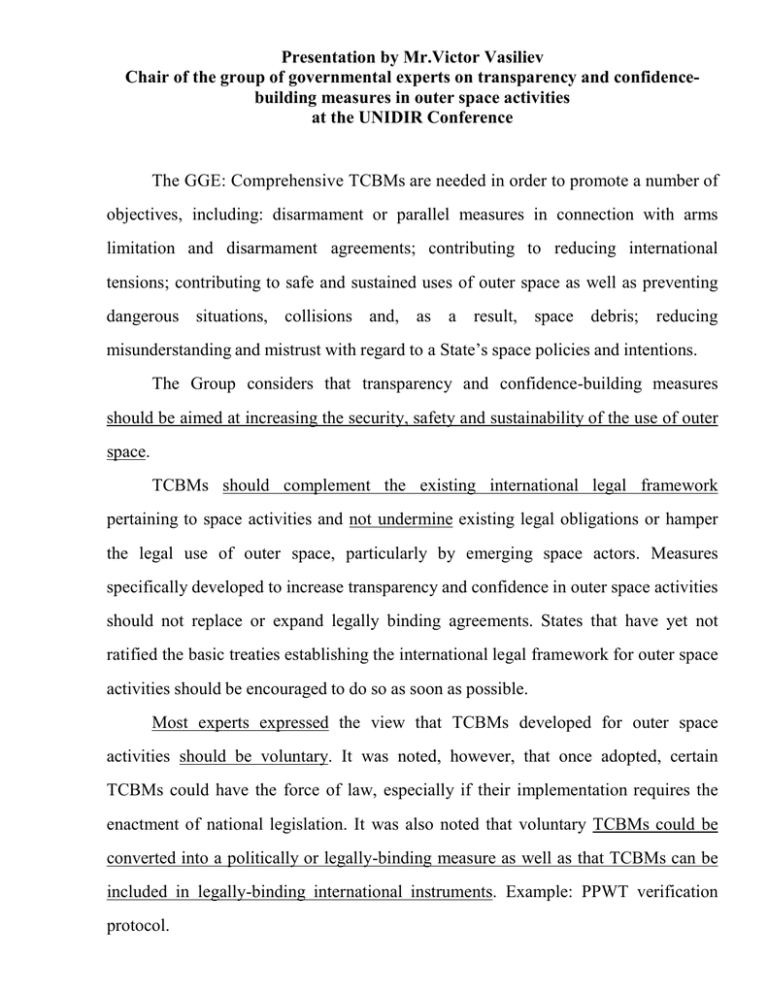
Presentation by Mr.Victor Vasiliev Chair of the group of governmental experts on transparency and confidencebuilding measures in outer space activities at the UNIDIR Conference The GGE: Comprehensive TCBMs are needed in order to promote a number of objectives, including: disarmament or parallel measures in connection with arms limitation and disarmament agreements; contributing to reducing international tensions; contributing to safe and sustained uses of outer space as well as preventing dangerous situations, collisions and, as a result, space debris; reducing misunderstanding and mistrust with regard to a State’s space policies and intentions. The Group considers that transparency and confidence-building measures should be aimed at increasing the security, safety and sustainability of the use of outer space. TCBMs should complement the existing international legal framework pertaining to space activities and not undermine existing legal obligations or hamper the legal use of outer space, particularly by emerging space actors. Measures specifically developed to increase transparency and confidence in outer space activities should not replace or expand legally binding agreements. States that have yet not ratified the basic treaties establishing the international legal framework for outer space activities should be encouraged to do so as soon as possible. Most experts expressed the view that TCBMs developed for outer space activities should be voluntary. It was noted, however, that once adopted, certain TCBMs could have the force of law, especially if their implementation requires the enactment of national legislation. It was also noted that voluntary TCBMs could be converted into a politically or legally-binding measure as well as that TCBMs can be included in legally-binding international instruments. Example: PPWT verification protocol. 2 TCBMs can be developed and implemented unilaterally, bilaterally and multilaterally. The Group is of the view that TCBMs developed in a multilateral framework would have the best chance of adoption by the international community. During the deliberations at the first and the second session of the Group the following practical TCBMs were outlined and included in the draft report 1. Measures aimed at enhancing the transparency of outer space programmes. A. Information exchanges B. Familiarization visits - Expert visits, including visits to space launch sites, flight command and control centers and other operations facilities of outer space infrastructure. - Demonstrations of rocket and space technologies. - Invitation of observers to launch sites. 2. Measures aimed at expanding the information available on outer space objects. A. Information exchanges - Forecasted dangerous situations in outer space. - Exchanges of information on basic orbital parameters of outer space objects. (In accordance with the 1975 Convention on Registration of Objects Launched into Outer Space, States should provide registration information as soon as practicable to the Secretary- General of the United Nations). - Exchanges of information on potential orbital conjunctions in space. - Exchanges of information on forecast natural hazards in outer space. (Consistent with the Outer Space Treaty of 1967, States should immediately inform other States or the Secretary General of the United Nations of any phenomena they 3 discover in outer space, including on the Moon and other celestial bodies, which could constitute a danger to the lives or health of astronauts or to other human spaceflight activity). B. Notifications - Notification of planned spacecraft launches (the Hague Code of Conduct Against Ballistic Missile Proliferation). - The beginning of descent from orbit of unguided space objects and the predicted impact areas on Earth. -Notifications of scheduled maneuvers that may result in risk to the safety of flight of other space objects and planned space launches. - Notifications of uncontrolled high-risk re-entry events. - The return of a spacecraft with a nuclear source of power of board, in the case of malfunction and danger of radioactive materials descending to Earth. - Notification of orbital debris events posing a risk to the safety of flight of other space objects. - Prior notification of intentional orbital break-ups. 3. - Measures related to rules of conduct for outer space activities. June 2012 draft International Code of Conduct for Outer Space Activities as proposed by the European Union suggests a number of such TCBMs. 4. Other transparency and confidence-building measures (Example: no placement of weapons in Space). International cooperation (States are encouraged, including through their space agencies, existing mechanisms and international organizations, to promote synergy of their space policies and space programmes). 4 Consultative mechanisms Consultations to prevent or minimize potential risks of damage or potentially harmful interference. Without prejudice to existing consultation mechanisms provided for in Article IX of the Outer Space Treaty of 1967 and in Article 56 of the ITU Constitution, States should utilize consultations if they have reason to believe that another State’s space activities are, or may be, contrary to voluntary, non-legally binding commitments regarding the peaceful use of outer space. Outreach Outreach measures can help to promote the security of all states by fostering mutual trust through the implementation of political and diplomatic measures relating to space activities. Specific measures may include outreach through thematic workshops and conferences. (UNIDIR annual conferences Secure World Foundation of the NGO) Coordination Existing coordination mechanisms, established in accordance with international law play an essential role in upholding the principle that space systems of all nations to have the rights of passage through, and conduct of operations in, space without interference. - Compliance with and promotion of relevant treaties, conventions and other commitments relating to outer space activities. (States should encourage universal adoption, implementation, and full adherence to the existing legal framework relating to outer space activities to which they are parties, or subscribe to, including: The Treaty on Principles Governing the Activities of States in the Exploration and Use of Outer Space, including the Moon and Other Celestial Bodies (1967); The Agreement on the Rescue of Astronauts, the Return of Astronauts and the Return of Objects 5 Launched into Outer Space (1968); The Convention on International Liability for Damage Caused by Space Objects (1972); The Convention on Registration of Objects Launched into Outer Space (1975); The Constitution and Convention of the International Telecommunication Union and its Radio Regulations, as amended; The Convention of the World Meteorological Organization, as amended; and the Comprehensive Nuclear-Test-Ban Treaty (1996)). - Implementation of COPUOS principles, guidelines and standards. (States should take measures to implement, to the greatest extent practicable, internationally recognized principles, guidelines, and standards endorsed on the basis of consensus by COPUOS and the United Nations General Assembly). - Participation in United Nations bodies. (Consistent with existing international obligations, States should participate in the outer space-related activities of United Nations intergovernmental bodies, including the Conference on Disarmament, the International Telecommunication Union, the World Meteorological Organization, and the Commission on Sustainable Development. States conducting space activities should actively participate, as members or observers, in activities of COPUOS. COPUOS-CD-ITU-WMO-UNSG (ODA)) Conclusions and recommendations
